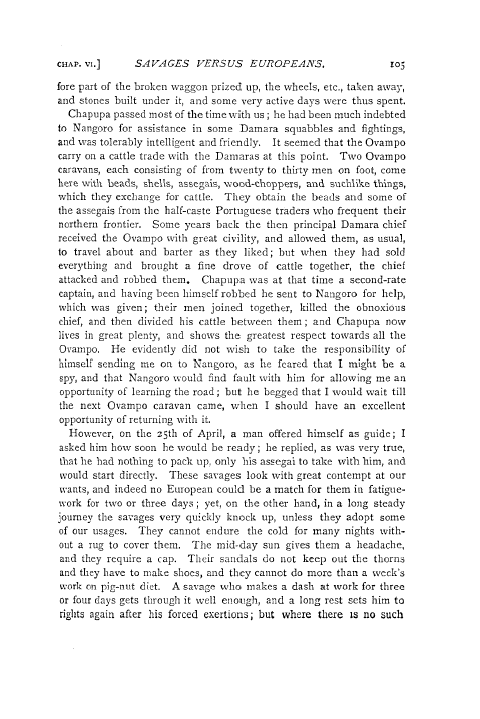| ||||||

OCR Rendition - approximateCHAP. vi.] SAVAGES VERSUS EUROPEANS. rg fore part of the broken waggon prized up, the wheels, etc., taken away, and stones built under it, and some very active days were thus spent. Chapupa passed most of the time with us; he had been much indebted to Nangoro for assistance in some Damara squabbles and fightings, and was tolerably intelligent and friendly. It seemed that the Ovampo carry on a cattle trade with the Damaras at this point. Two Ovampo caravans, each consisting of from twenty to thirty men on foot, come here with beads, shells, assegais, wood-choppers, and suchlike things, which they exchange for cattle. They obtain the beads and some of the assegais from the half-caste Portuguese traders who frequent their northern frontier. Some years back the then principal Damara chief received the Ovampo with great civility, and allowed them, as usual, to travel about and barter as they liked; but when they had sold everything and brought a fine drove of cattle together, the chief attacked and robbed them. Chapupa was at that time a second-rate captain, and having been himself robbed he sent to Nangoro for help, which was given; their men joined together, killed the obnoxious chief, and then divided his cattle between them ; and Chapupa now lives in great plenty, and shows the greatest respect towards all the Ovampo. He evidently did not wish to take the responsibility of himself sending me on to Nangoro, as he feared that I might be a spy, and that Nangoro would find fault with him for allowing me an opportunity of learning the road; but he begged that I would wait till the next Ovampo caravan came, when I should have an excellent opportunity of returning with it. However, on the 25th of April, a man offered himself as guide; I asked him how soon he would be ready ; he replied, as was very true, that he had nothing to pack up, only his assegai to take with him, and would start directly. These savages look with great contempt at our wants, and indeed no European could be a match for them in fatiguework for two or three days ; yet, on the other hand, in a long steady journey the savages very quickly knock up, unless they adopt some of our usages. They cannot endure the cold for many nights without a rug to cover them. The mid-day sun gives them a headache, and they require a cap. Their sandals do not keep out the thorns and they have to make shoes, and they cannot do more than a week's work on pig-nut diet. A savage who makes a dash at work for three or four days gets through it well enough, and a long rest sets him to rights again after his forced exertions; but where there is no such |